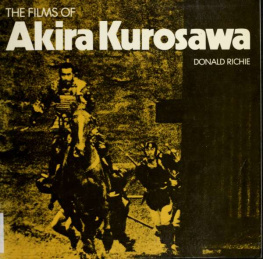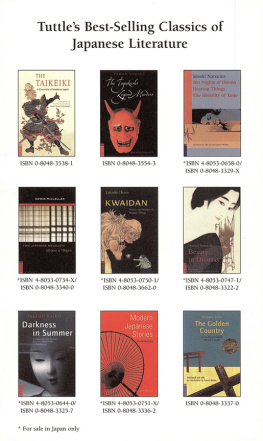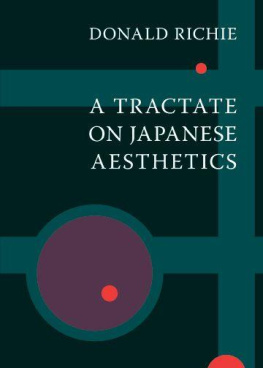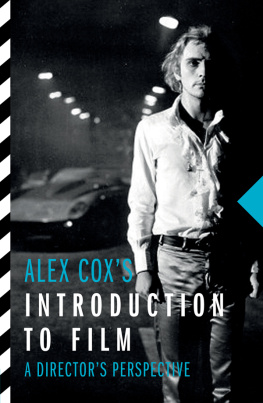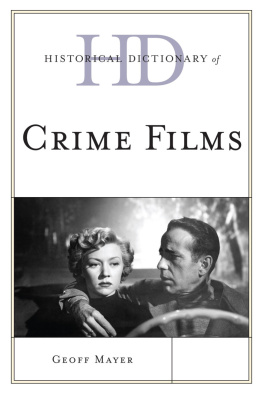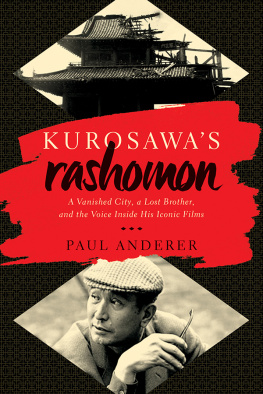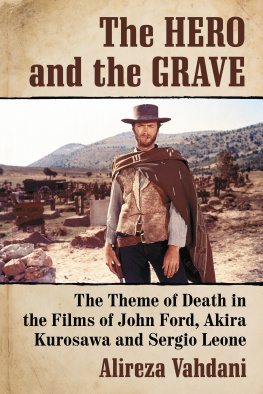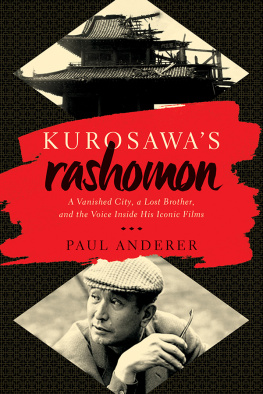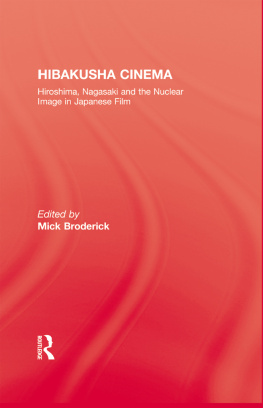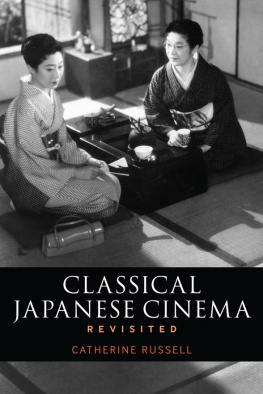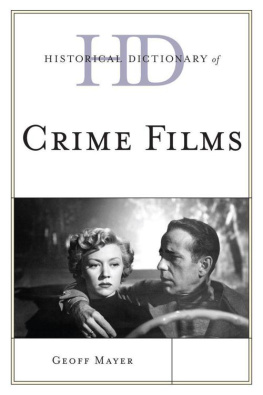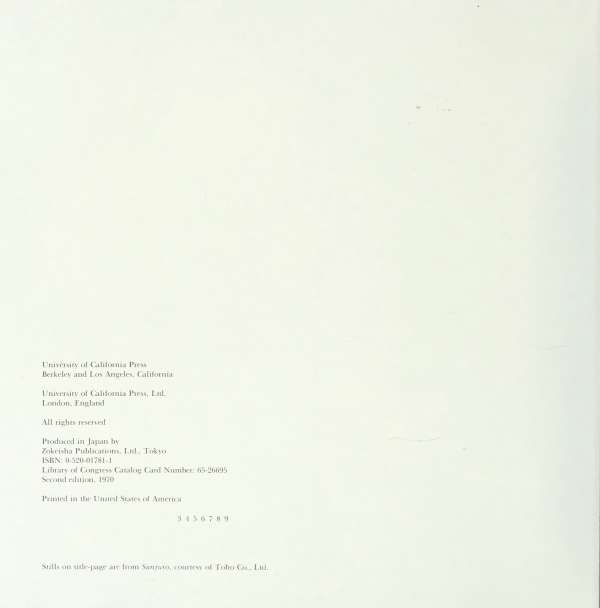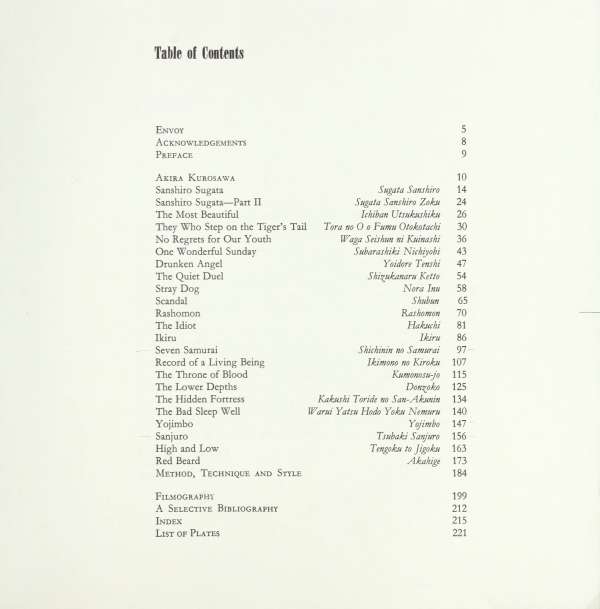This book made available by the Internet Archive.

*

\
t ..:



A fishing spot along the Tamagawa River.
Kurosawa and Chiaki are fishing.
It is during the shooting of Seven Samurai: only half the film is finished, the budget is all used up, shooting is interrupted.
Chiaki: So what's going to happen ?
Kurosawa: Well, the company isn't going to throw away all the money it's already put into the film. So long as my pictures are hits I can afford to be unreasonable. Of course, if they start losing money then I've made some enemies.
Money is found, shooting is begun again; money is used up, shooting is interrupted. Kurosawa and Chiaki go fishing again.
Kurosawa: (Dangling his line with some satisfaction.) Now that they've gotten in this deep, they have no choice but to finish it!
And, indeed, Seven Samurai finally got finished; it took over a year and was a big hit.
Chiaki's house.
He and Kurosawa are drinking; both are rather drunk.
Kurosawa: Hey, Chiaki. You probably got more for appearing in the picture than
I got for directing it. You're too expensive! Chiaki: (Frowning silence. Then his inner-voice speaks, though no one hears:)
It isn't that I'm too expensive; it's that you're too cheap.
At the golf course.
Kurosawa and Chiaki are playing golf. Kurosawa hits the ball. It goes off to one side. Chiaki hits the ball. It goes high and straighta beautiful shot.
Kurosawa: (Dejected.) Why is it I'm so lousy ?
Chiaki: When you are making films you are a demon of strength; when you can't hit the golf-ball you are like some little girl. Where is this strength; where does it go ?
Kurosawa: It is quite enough if a human being has but one thing where he is strong. (As though to console himself.) If a human being were strong in everything it wouldn't be nice for other people, would it ?
Written by Minoru Chiaki upon being asked for a word-portrait of Akira Kurosawa.
ilCknOWlBugDlBniS Toho was of the greatest help in preparing this book. In particular I would like to mention the interest of Mr. and Mrs. Nagamasa Kawa-kita; the assistance of Mr. Tokugo Konishi in arranging the many screenings and re-screenings of Kurosawa's films; that of Mr. Junichi Hayashi in acting as liason with Kurosawa, and that of Mr. Michio Matsuya in gathering the stills. Most of these appear through courtesy of Toho; those from Rashomon and Quiet Duel are from Daiei, where I am indebted to Mr. Keigo Hirao; those from The Idiot and Scandal are from Shochiku, where Mr. Shinji Serada helped me. The open-set stills from Rashomon and Seven Samurai are from the estate of the late Tokutaro Osawa.
I am also indebted to Unijapan Film, to Mr. Toyoji Kuroda, the secretarygeneral, and his staff, particularly Miss Hisako Yamaki and Mr. Osamu Sakamoto; and to the Kinema Jumpo staff for kindly allowing me to quote from their publication. In preparing the manuscript I am extremely grateful to Mr. Lee C. Colegrove who caught many an error. In preparing this second edition I am likewise grateful to David Madden and Jay Chapman for their help in correcting the errors incorporated into the first edition. In particular, I am grateful to Mary Richie because it was during those times that we talked of film and of Kurosawa that many of the interpretations in this book evolved. Finally, I want to thank Erick Klestadt for his great helpso great that without it the book would not have been written.
DONALD RICHIE NEW YORK
Preface
That the Japanese film is known at all in the West is due mainly to the pictures of Akira Kurosawa; that I am known both here and abroad as an actor is also mainly due to him. From Drunken Angel to Red Beard I have worked in almost all of his films, sixteen in all. He taught me practically everything I know, and it was he who first introduced me to myself as an actor.
Kurosawa has this quality, this ability to bring things out of you that you never knew were there. It is enormously difficult work, but each picture with him is a revelation. When you see his films, you find them full realizations of ideas, of emotions, of a philosophy which surprises with its strength, even shocks with its power. You had not expected to be so moved, to find within your own self this depth of understanding.
He is an artist, and he is demanding; a man more full, more whole, both more self-willed and more compassionate than most men are. It is from this understanding, this tact with life, that he draws his films, just as he draws from us, his actors, our best.
I know. I have never as an actor done anything that I am proud of other than with him.

Toshiro Mifune
thought: Even if I could make my living by painting, who would look at my pictures i"
Uegusa had gone to a different middle school but "nevertheless, we met occasionally. Several years after graduation, Kurosawa and I both entered the Japan Proletariat Artists' Group. He was in the fine arts section. I was in the literary section. We signed up not because we were in love with Marxist theory but because we felt such a strong resistance against things as they were and in this group at that time we could study the new movements in art and literature. We were both much inter' ested in the latterparticularly in nineteenth century Russian literature." Kurosawa remembers: "I was a great readerwe would talk for hours about Tolstoy, Turgenev, Dostoevsky, etc... particularly of DostO' evsky. I was very fond of him, and have remained so to this day. He was a great influence.
"Another influence, and someone I will never forget, was my elder brother Heigo. He was the third brotherthat is, the one directly above me, and after Tachikawa he had the greatest influence on my life.
"He was artistic, and he loved films. During the end of the silent' film period he was a benshi [film narrator'commentator] appearing under the name of Teimei Tsuda at the Musashino Cinema. He specialized in foreign silent films and used to fascinate his listeners with his detailed psychological descriptions.

